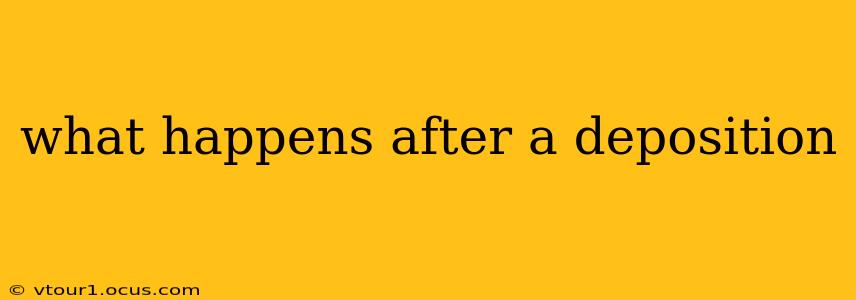Depositions are a crucial part of the discovery process in civil litigation. They're formal, out-of-court question-and-answer sessions where a witness testifies under oath. But what happens after the deposition concludes? The process isn't simply over with the final question. Several important steps follow, impacting the overall trajectory of the case. This guide will clarify the post-deposition procedures and their significance.
What Happens to the Deposition Transcript?
This is arguably the most important immediate outcome. After the deposition, a court reporter prepares a verbatim transcript of the proceedings. This transcript is a legally binding document and serves as the official record of the testimony. Both sides receive a copy of this transcript, allowing them time to review the witness's statements carefully.
How long does it take to receive the deposition transcript?
The timeframe for receiving the transcript can vary, depending on the length of the deposition and the court reporter's workload. Typically, it can take anywhere from a few days to a few weeks. Urgent requests might incur expedited fees.
Reviewing the Deposition Transcript: Identifying Discrepancies and Strategies
Once you have the transcript, your legal team will meticulously review it. This involves:
- Identifying inconsistencies: Are there discrepancies between the witness's deposition testimony and prior statements (such as in written discovery responses or affidavits)? These inconsistencies can be extremely valuable during trial.
- Highlighting key admissions: The review helps pinpoint admissions made by the witness that support your client's case.
- Developing trial strategy: The deposition transcript becomes a fundamental tool in shaping your trial strategy, including deciding which witnesses to call, what evidence to present, and how to cross-examine opposing witnesses.
Using the Deposition Transcript in Further Litigation
The transcript plays a pivotal role in the later stages of litigation. It's used for several critical purposes:
- Motion practice: Inconsistencies or damaging admissions within the transcript might form the basis of motions to dismiss, motions for summary judgment, or other pre-trial motions.
- Trial preparation: The transcript is indispensable for witness preparation and trial strategy development. Attorneys use it to prepare their witnesses for cross-examination and to anticipate opposing counsel's questions.
- Trial itself: The transcript can be used during trial to impeach a witness's credibility (show they've made contradictory statements) or to introduce evidence that supports your case. Portions of the transcript might even be read to the jury.
Are There Any Post-Deposition Motions?
While not directly related to the transcript itself, certain motions might arise because of the deposition's content. These often involve challenges to the deposition process itself, such as:
- Motion to Compel: If a witness refused to answer questions, a motion to compel can be filed to force them to answer.
- Motion to Strike: If the deposition was conducted improperly (for example, improper objections by opposing counsel), a motion to strike portions of the transcript might be filed.
What if There Were Objections During the Deposition?
Objections during a deposition are carefully noted by the court reporter. However, they don't usually stop the witness from answering the question. The objection is preserved for later consideration, and the court will decide the admissibility of the testimony at trial. This means the judge ultimately decides whether an objection was valid.
Can a Deposition Be Used Against You?
Absolutely. A deposition is given under oath, and your testimony can be used against you at trial. Accurate and consistent responses are crucial.
In Conclusion: The Deposition's Lasting Impact
The deposition process doesn't end when the witness leaves the room. The post-deposition phase is equally, if not more, important. The transcript serves as a powerful tool, influencing the direction of the case and ultimately shaping the outcome. Careful review, strategic analysis, and skillful use of the transcript are crucial elements in achieving success in litigation.
